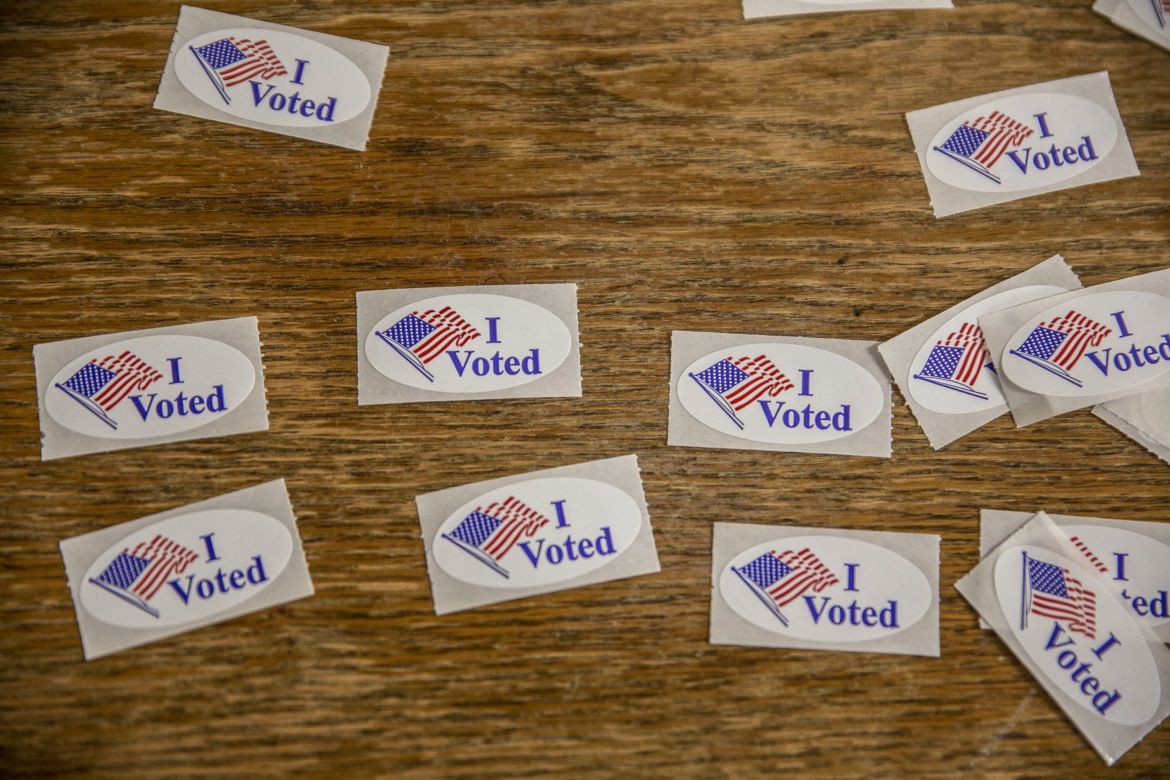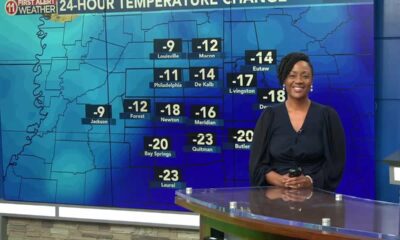Mississippi Today
Legislature restores no voting rights during 2023 session

Legislature restores no voting rights during 2023 session
The Mississippi Legislature, for the first time since 2016, did not restore voting rights to any person convicted of a felony.
Mississippi is the only state in the nation that requires people convicted of certain felonies to petition the Legislature to restore their voting rights. Most years the Legislature passes a handful of bills — normally about five — to restore voting rights to individuals convicted of felonies.
Seven bills restoring voting rights died on the Senate calendar when the 2023 session ended on Saturday around 2 a.m. Senate Judiciary B Chair Joey Fillingane, R-Sumrall, said he opted to let the bills die instead of bringing them up for a vote because he did not think he could garner the two-thirds majority needed to pass each bill.
“It seemed like there was not enough support,” Fillingane said. “They barely passed out of committee on close votes. And before the full Senate, it takes a two-thirds vote instead of a majority vote to pass. Instead of embarrassing anyone by calling them up and having them defeated, we decided not to call them up.”
Fillingane said he spoke with the senators who he thought would be on the fence, and they all indicated they would be “no” votes.
Mississippi is among a handful of states — fewer than 10 — that do not restore voting rights at some point after people complete their sentence. And Mississippi is the only state requiring people to navigate the cumbersome legislative maze to have their voting rights restored.
The most suffrage bills passed in one session during the 2000s was in 2004 when 34 were approved, according to a Mississippi Today analysis. In 2009, 2012 and 2016, like this past session, no felony suffrage bill was approved. In 2021, there were five approved and in 2021 two were passed.
A lawsuit is pending before the U.S. Supreme that argues Mississippi’s felony suffrage provisions are in violation of the U.S. Constitution. The lawsuit argues that the provision was placed in the state’s 1890 constitution as one of many devices to prevent Black Mississippians from voting. The thought at the time was that impoverished African Americans might be more prone to commit certain crimes like theft and embezzlement, so those specific crimes were determined by the writers of the state constitution to be disenfranchising crimes. Meanwhile, the framers deemed people did not lose the right to vote for many more serious crimes such as murder and rape.
In 2022, the 5th Circuit Court of Appeals conceded that the provision was placed in the state constitution as a deterrent to African Americans voting. But the appeals court ruled in a split decision that because the state constitution was amended later to make murder and rape disenfranchising crimes, that the 1890 provision was no longer unconstitutional.
The Mississippi Center for Justice and others are appealing that decision to the U.S. Supreme Court.
Rob McDuff, an attorney with the center, said the fact that the Supreme Court has not yet dismissed the case could be a good sign and suggest the justices “are continuing to look at it.” The case was appealed to the Supreme Court in October 2022.
McDuff said it was disappointing that the Legislature did not restore any voting rights this session, but stressed that there are “thousands of people who have served their sentence and the fact that the Legislature generally restores voting rights to a few each session is another indication that the provision in the 1890 Constitution should be repealed in its entirety.”
Fillingane said the Senate in recent years has normally restored voting rights to only those convicted of crimes that would be considered non-violent, such as embezzlement. He said those convicted this year were convicted of crimes that could be considered more violent, such as robbery. One of the people under consideration had been convicted of using public property illegally. The Senate has routinely refused to take up cases where people were convicted of stealing or embezzling public funds.
But Fillingane said as chair of the Judiciary B Committee he wanted to give those people an opportunity this year but opted not to bring them up before the full Senate because he did not think there were enough votes to pass them.
The original list of crimes deemed to be disenfranchising has been updated by official opinions from the Attorney General’s office through the years to coincide with modern criminal law.
The crimes on the list via the opinions are arson, armed robbery, bigamy, bribery, embezzlement, extortion, felony bad check, felony shoplifting, forgery, larceny, murder, obtaining money or goods under false pretense, perjury, rape, receiving stolen property, robbery, theft, timber larceny, unlawful taking of a motor vehicle, statutory rape, carjacking and larceny under lease or rental agreement.
This article first appeared on Mississippi Today and is republished here under a Creative Commons license.
Mississippi Today
On this day in 1997


Dec. 22, 1997

The Mississippi Supreme Court upheld the conviction of white supremacist Byron De La Beckwith for the 1963 murder of Medgar Evers.
In the court’s 4–2 decision, Justice Mike Mills praised efforts “to squeeze justice out of the harm caused by a furtive explosion which erupted from dark bushes on a June night in Jackson, Mississippi.”
He wrote that Beckwith’s constitutional right to a speedy trial had not been denied. His “complicity with the Sovereignty Commission’s involvement in the prior trials contributed to the delay.”
The decision did more than ensure that Beckwith would stay behind bars. The conviction helped clear the way for other prosecutions of unpunished killings from the Civil Rights Era.
This article first appeared on Mississippi Today and is republished here under a Creative Commons license.![]()
Mississippi Today
Medicaid expansion tracker approaches $1 billion loss for Mississippi

About the time people ring in the new year next week, the digital tracker on Mississippi Today’s homepage tabulating the amount of money the state is losing by not expanding Medicaid will hit $1 billion.
The state has lost $1 billion not since the start of the quickly departing 2024 but since the beginning of the state’s fiscal year on July 1.
Some who oppose Medicaid expansion say the digital tracker is flawed.
During an October news conference, when state Auditor Shad White unveiled details of his $2 million study seeking ways to cut state government spending, he said he did not look at Medicaid expansion as a method to save money or grow state revenue.
“I think that (Mississippi Today) calculator is wrong,” White said. “… I don’t think that takes into account how many people are going to be moved off the federal health care exchange where their health care is paid for fully by the federal government and moved onto Medicaid.”
White is not the only Mississippi politician who has expressed concern that if Medicaid expansion were enacted, thousands of people would lose their insurance on the exchange and be forced to enroll in Medicaid for health care coverage.
Mississippi Today’s projections used for the tracker are based on studies conducted by the Institutions of Higher Learning University Research Center. Granted, there are a lot of variables in the study that are inexact. It is impossible to say, for example, how many people will get sick and need health care, thus increasing the cost of Medicaid expansion. But is reasonable that the projections of the University Research Center are in the ballpark of being accurate and close to other studies conducted by health care experts.
White and others are correct that Mississippi Today’s calculator does not take into account money flowing into the state for people covered on the health care exchange. But that money does not go to the state; it goes to insurance companies that, granted, use that money to reimburse Mississippians for providing health care. But at least a portion of the money goes to out-of-state insurance companies as profits.
Both Medicaid expansion and the health care exchange are part of the Affordable Care Act. Under Medicaid expansion people earning up to $20,120 annually can sign up for Medicaid and the federal government will pay the bulk of the cost. Mississippi is one of 10 states that have not opted into Medicaid expansion.
People making more than $14,580 annually can garner private insurance through the health insurance exchanges, and people below certain income levels can receive help from the federal government in paying for that coverage.
During the COVID-19 pandemic, legislation championed and signed into law by President Joe Biden significantly increased the federal subsidies provided to people receiving insurance on the exchange. Those increased subsidies led to many Mississippians — desperate for health care — turning to the exchange for help.
White, state Insurance Commissioner Mike Chaney, Gov. Tate Reeves and others have expressed concern that those people would lose their private health insurance and be forced to sign up for Medicaid if lawmakers vote to expand Medicaid.
They are correct.
But they do not mention that the enhanced benefits authored by the Biden administration are scheduled to expire in December 2025 unless they are reenacted by Congress. The incoming Donald Trump administration has given no indication it will continue the enhanced subsidies.
As a matter of fact, the Trump administration, led by billionaire Elon Musk, is looking for ways to cut federal spending.
Some have speculated that Medicaid expansion also could be on Musk’s chopping block.
That is possible. But remember congressional action is required to continue the enhanced subsidies. On the flip side, congressional action would most likely be required to end or cut Medicaid expansion.
Would the multiple U.S. senators and House members in the red states that have expanded Medicaid vote to end a program that is providing health care to thousands of their constituents?
If Congress does not continue Biden’s enhanced subsidies, the rates for Mississippians on the exchange will increase on average about $500 per year, according to a study by KFF, a national health advocacy nonprofit. If that occurs, it is likely that many of the 280,000 Mississippians on the exchange will drop their coverage.
The result will be that Mississippi’s rate of uninsured — already one of the highest in the nation – will rise further, putting additional pressure on hospitals and other providers who will be treating patients who have no ability to pay.
In the meantime, the Mississippi Today counter that tracks the amount of money Mississippi is losing by not expanding Medicaid keeps ticking up.
This article first appeared on Mississippi Today and is republished here under a Creative Commons license.![]()
Mississippi Today
On this day in 1911


Dec. 21, 1911

Josh Gibson, the Negro League’s “Home Run King,” was born in Buena Vista, Georgia.
When the family’s farm suffered, they moved to Pittsburgh, and Gibson tried baseball at age 16. He eventually played for a semi-pro team in Pittsburgh and became known for his towering home runs.
He was watching the Homestead Grays play on July 25, 1930, when the catcher injured his hand. Team members called for Gibson, sitting in the stands, to join them. He was such a talented catcher that base runners were more reluctant to steal. He hit the baseball so hard and so far (580 feet once at Yankee Stadium) that he became the second-highest paid player in the Negro Leagues behind Satchel Paige, with both of them entering the National Baseball Hame of Fame.
The Hall estimated that Gibson hit nearly 800 homers in his 17-year career and had a lifetime batting average of .359. Gibson was portrayed in the 1996 TV movie, “Soul of the Game,” by Mykelti Williamson. Blair Underwood played Jackie Robinson, Delroy Lindo portrayed Satchel Paige, and Harvey Williams played “Cat” Mays, the father of the legendary Willie Mays.
Gibson has now been honored with a statue outside the Washington Nationals’ ballpark.
This article first appeared on Mississippi Today and is republished here under a Creative Commons license.![]()
-

 News from the South - Arkansas News Feed7 days ago
News from the South - Arkansas News Feed7 days agoFaith-inspired ministry opens health clinic in Little Rock
-

 News from the South - Florida News Feed6 days ago
News from the South - Florida News Feed6 days ago‘Dirty Dancing,’ ‘Beverly Hills Cop,’ ‘Up in Smoke’ among movies entering the National Film Registry
-

 Our Mississippi Home5 days ago
Our Mississippi Home5 days agoThe Meaning of the Redbird During the Holiday Season
-

 Mississippi Today4 days ago
Mississippi Today4 days agoMississippi PERS Board endorses plan decreasing pension benefits for new hires
-

 Local News1 day ago
Local News1 day agoHard Rock Hotel & Casino Biloxi Honors Veterans with Wreath-Laying Ceremony and Holiday Giving Initiative
-

 News from the South - North Carolina News Feed2 days ago
News from the South - North Carolina News Feed2 days agoSocial Security benefits boosted for millions in bill headed to Biden’s desk • NC Newsline
-

 News from the South - Missouri News Feed2 days ago
News from the South - Missouri News Feed2 days agoCould prime Albert Pujols fetch $1 billion in today's MLB free agency?
-

 Mississippi News Video3 days ago
Mississippi News Video3 days ago12/19- Friday will be breezy…but FREEZING by this weekend































